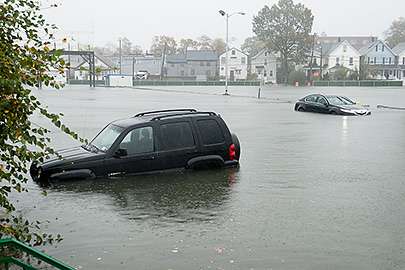Disaster relief helps the incumbent, research shows

(Phys.org)—A 2009 study from the Stanford Graduate School of Business and Loyola Marymount University suggests President Obama may get a bump in the polls from Superstorm Sandy.
How might Superstorm Sandy affect the 2012 presidential election? Political analysts are speculating about the impact of the storm on early voting and the candidates' abilities to campaign in battleground states.
But research by political scientist Neil Malhotra, an associate professor of political economy at the Stanford Graduate School of Business, and economist Andrew Healy of Loyola Marymount University suggests a different kind of effect. Their findings, published in the American Political Science Review in 2009, show that voters reward presidents for delivering relief spending after a disaster strikes.
Examining data from 1988-2004, Healy and Malhotra found that a doubling of relief payments before an election on average boosts the incumbent's vote share by about half a percentage point, potentially enough to swing a very close election. The images of President Obama visiting the Federal Emergency Management Agency (FEMA) and pledging federal disaster aid to affected communities therefore may help him at the ballot box next week, Malhotra said.
But the tendency of voters to be influenced by disaster payments may not be optimal for the country.
Healy and Malhotra found that money the government spends on preparing for disaster provides no boost for the incumbent president. This creates incentives for presidents to deliver relief spending, rather than preparing for disasters before they take place.
Since 1988, the amount of money the United States spends on disaster relief has increased 13 times while the amount of spending on disaster preparedness has been flat. The researchers also found evidence to support Benjamin Franklin's adage: "An ounce of prevention is worth a pound of cure." They estimated that $1 in preparedness spending was worth $15 in relief payments in preventing future disasters.
While President Obama may benefit from a visible and swift response to Superstorm Sandy, voters' willingness to reward relief over preparedness efforts costs the United States billions of dollars a year, the researchers found.
More information: myweb.lmu.edu/ahealy/papers/he … ly_malhotra_2009.pdf
Journal information: American Political Science Review
Provided by Stanford University
















